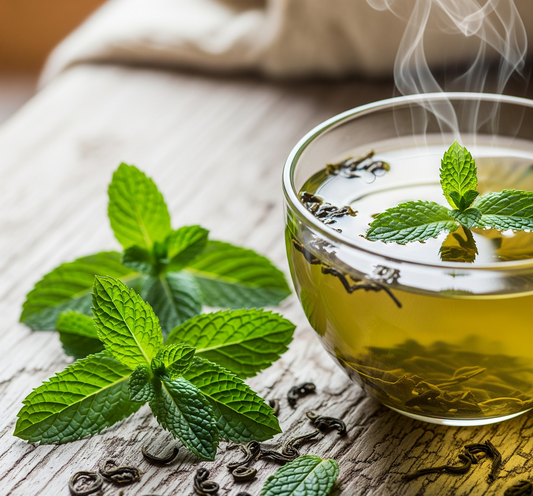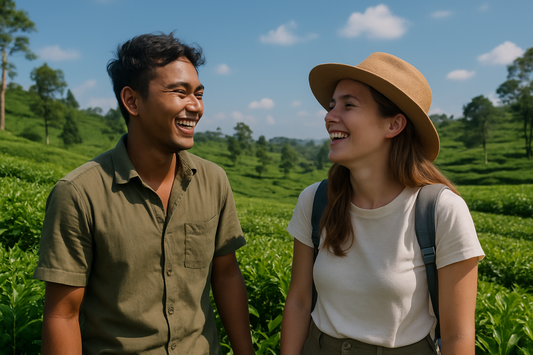Caffeine is known to give a boost of energy and has been popular in the global market as a natural stimulant. Coffee has been so heavily marketed for its caffeine content and consequently its caffeine boost that teas, especially loose leaf tea, are rarely associated with it. But Camellia Sinensis, the plant that gives all the varieties of tea, naturally produces caffeine in its leaves.

Caffeine scientifically known as 1,3,4 -trimethylxanthine is toxic to most pests. Tea plants produce caffeine to keep bugs and pests dangerous to its young growth away with a shocking jolt.
It’s amazing to think how caffeine has the exact opposite effect on humans i.e. we get a surge of clarity and energy fighting away the almost always lurking fogginess. And while coffee and tea both contain caffeine, tea has a compound called L- theanine which when combined with the caffeine has a much more relaxing effect.
The global market has been able to sell coffee to its consumers for this exact reason but tea too has a place in it with the brew’s caffeine component.
So why does coffee give more of a caffeine kick than tea?
Caffeine is a water soluble compound. And how much of a brew releases its caffeine power depends on the way they are prepared.

Coffee as a beverage served in restaurants and cafe chains are prepared with hotter water. The high temperature water allows for the brew to be prepared quicker. The extreme temperature extracts more caffeine from the beans than the tea leaves and hence also gives for the bitter flavor that everyone associates caffeine with. It should also be noted that a cup of coffee requires a lot more coffee beans than a cup of tea would require tea leaves.
Which tea would give me a higher caffeine boost?
As mentioned above, the steeping temperature and duration plays a key role when it comes to caffeine content. So the longer you steep your tea leaves in hotter water, the more bitter ergo the more caffeine rich your tea will get.
Black teas
Ask anybody for steeping recommendations for loose leaf black teas you will generally get a longer steep time.

Nepal Tea’s general recommendation for black teas is to steep 2 grams of the loose leaf tea in hot water of about 210 degrees fahrenheit for 5-8 minutes. 5 minutes is enough time to tease the intense, dark and bitter flavor- often what black tea drinkers expect from their brew, out.
White teas, green teas and oolong teas
For loose leaf white teas, green teas and oolong teas we recommend you steep 2 grams in hot water of about 160 degrees fahrenheit for 3-5 minutes for pretty much the same reasons.

Generally, tea drinkers are more lenient with letting oolong teas steep longer and hence they are known to have medium to high caffeine content. But delicate teas like white and green teas are always in danger of having their flavors ruined by hotter temperatures and tea drinkers steep them for a shorter period of time in cooler water. This is why even though the leaves that make up white teas have higher caffeine in them, the beverage itself is considered a low caffeine drink.
Other Caffeinated Teas
All teas made from the camellia sinensis plant contain some amount of caffeine. It is a general rule that leaves from Camellia Sinensis will have some amount of caffeine. Black tea leaves are able to release the highest amount of caffeine, followed by oolong teas, green teas and white teas because of the generally accepted brewing suggestion in the tea world.
Caffeine Content in Tea vs. Coffee
It is quite difficult to know the exact caffeine content in any given brew without getting every single lot tested. Many companies use a method called ultraviolet spectroscopy. There are caffeine testing strips available in the market that can help you measure caffeine content in your cup for your own personal research as well.

We found the following rough estimates for each tea type. These common ranges assume an 8-oz. cup of tea made with standard steepings relevant to the tea type.
Black Tea: Up to 65 mg/cup
Green Tea: Up to 50 mg/cup
Oolongs: typically 18-20 mg/cup, sometimes up to 40
White tea: The most variable! Anywhere from 5-65 mg/cup
Coffee: Upto 85-100 mg/cup
But because the caffeine content of a brewed cup depends on different elements, even teas within the same broad categories such as black tea may have different caffeine levels. That is why Kumari Gold and Kanchanjangha Noir will give you two completely different senses of caffeine boosts.
Since caffeine can affect people very differently depending on their own unique body chemistry and predispositions, it’s hard to predict just how the caffeine in a particular tea may affect you.
But as mentioned earlier, compared to coffees and the way the majority of the market serves it, teas are known to give a more gentle and subtle boost of energy with low to no crashing at the end of the day.

We do recommend taking notes of how each brew affects your body and consulting with a doctor if any discomfort arises with consumption of caffeinated drinks. There are wonderful options available that can provide you with amazing flavors like any other tea and are naturally non-caffeinated. Some of our options include Kathmandu Cosmos Decaf, Organic Lemongrass and Golden Milk.




